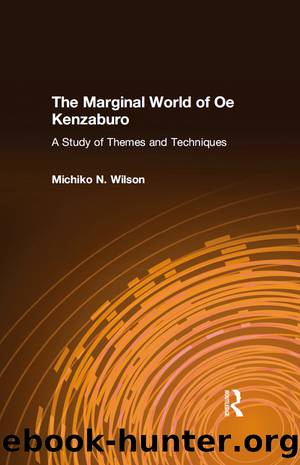The Marginal World of Oe Kenzaburo: A Study of Themes and Techniques by Michiko N. Wilson

Author:Michiko N. Wilson [Wilson, Michiko N.]
Language: eng
Format: epub
Tags: Social Science, Ethnic Studies, General, Minority Studies, Regional Studies
ISBN: 9781315286273
Google: -IgYDQAAQBAJ
Publisher: Routledge
Published: 2016-09-16T04:30:27+00:00
That the death of Mishima galvanized the composition of My Tears is no secret. In the prologue of the second publication of My Tears, Åe draws the relationship between Mishimaâs suicide and the Emperor System: the ostracized âA Political Boyâ is still alive and well in Åeâs mind. The devastating reception of the story had led him to seek elsewhere a literary mode that would free him from the âshackles of the Emperor System, a suppressor of political imaginationâ (p. 245). The most notable thing about Åeâs post-1968 stories that deal with sociopolitical topics is the adoption of black humor, exaggeration, madness, the parodic, and the satiric. My Tears maximizes this âlegitimacy of the exercise of a free imagination that is politically committed,â27 but not bound to the mimetic representation of reality. The work is his challenge, as a writer, to âthe cultural tradition headed by the Emperor System,â whereas Mishima wrote Runaway Horses as a justification of that tradition and system. In a world turned upside down, Åe parodies the âpossessed words of equivocationâ that allowed Mishima to create the ideal youth, whose eloquent speech is unequalled. The thirty-five-year-old narrator of My Tears plays a âdoubleâ for both the dead author and the canonized boy, âthe wrong sideâ of everything the Emperor System continues to suggest. Instead of the divine Emperor waiting for the narrator/biographer to wipe his tears away (the title of My Tears clearly indicates the presence of the Emperor by the use of the verb âto wipeâ in honorific form, nuguitamÅ), it is his motherâs âscratchy thumbsâ that âexpertly wipe away the tears in the corners of his closed eyes.â
At the end of a narrative discourse that zigzags, spins, and seesaws, who is given the final words? âSooner or later the Japanese are going to change their attitude about what happened, and I intend to live to see it, yessir!â (162/105). Such is the hope the narratorâs mother expresses. âAbout what happenedâ (kono koto ni tsuite) refers to August 15, 1945, the one event narrated n times in connection with the Emperor System. The mother pities her son for the first time: âAnd here he is thirty-five years old, itâs a cruel business! When he was a child heâd dream the teacher at elementary school was asking him IF THE EMPEROR ORDERED YOU TO DIE, WOULD YOU DIE? and heâd sob and repeat the cruel answer in his sleep, YES, I WOULD DIE, I WOULD DIE HAPPILY! and he is thirty-five years old and still weeping away as if the teacher was asking him that same question, itâs a cruel business, yessir!]]â (162â63/105â106). No matter how he shuts himself up in seclusion, whether he is a conservative or a progressive, Åe repeats, as long as the Emperor System remains, a Japanese writer cannot disavow his political involvement.28 Writing, for Åe, is more than âa personal matterâ: it is a political act.
Download
This site does not store any files on its server. We only index and link to content provided by other sites. Please contact the content providers to delete copyright contents if any and email us, we'll remove relevant links or contents immediately.
Phoenicians among Others: Why Migrants Mattered in the Ancient Mediterranean by Denise Demetriou(596)
american english file 1 student book 3rd edition by Unknown(590)
Verus Israel: Study of the Relations Between Christians and Jews in the Roman Empire, AD 135-425 by Marcel Simon(585)
Caesar Rules: The Emperor in the Changing Roman World (c. 50 BC â AD 565) by Olivier Hekster(569)
Basic japanese A grammar and workbook by Unknown(554)
Europe, Strategy and Armed Forces by Sven Biscop Jo Coelmont(512)
Give Me Liberty, Seventh Edition by Foner Eric & DuVal Kathleen & McGirr Lisa(491)
Banned in the U.S.A. : A Reference Guide to Book Censorship in Schools and Public Libraries by Herbert N. Foerstel(479)
The Roman World 44 BC-AD 180 by Martin Goodman(469)
Reading Colonial Japan by Mason Michele;Lee Helen;(462)
DS001-THE MAN OF BRONZE by J.R.A(458)
The Dangerous Life and Ideas of Diogenes the Cynic by Jean-Manuel Roubineau(451)
Introducing Christian Ethics by Samuel Wells and Ben Quash with Rebekah Eklund(446)
Imperial Rome AD 193 - 284 by Ando Clifford(445)
The Oxford History of World War II by Richard Overy(444)
Catiline by Henrik Ibsen--Delphi Classics (Illustrated) by Henrik Ibsen(416)
Literary Mathematics by Michael Gavin;(406)
Language Hacking Mandarin by Benny Lewis & Dr. Licheng Gu(400)
Brand by Henrik Ibsen--Delphi Classics (Illustrated) by Henrik Ibsen(377)
